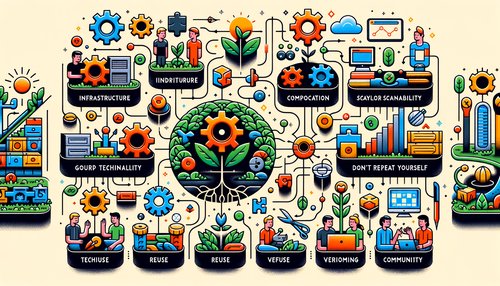Unlock Your Coding Potential: Top Python Best Practices for Efficient and Elegant Programming
Welcome to a journey that will transform the way you approach Python programming. Whether you're a beginner eager to dive into the world of coding or an experienced developer looking to refine your skills, this guide is designed to unlock your full coding potential. Python, known for its simplicity and readability, is a powerhouse in the world of programming. By adhering to best practices, you can write code that not only works efficiently but is also elegant and easy to maintain. Let's embark on this path together and explore the top practices that will elevate your Python programming.
Understanding Pythonic Concepts
The term "Pythonic" refers to the idioms, techniques, and styles that are uniquely Python. Embracing Pythonic concepts means writing code that effectively utilizes the features of Python, making it more intuitive and leveraging its full power. For instance, list comprehensions offer a concise way to create lists, while the use of generators can improve memory efficiency. Embracing these concepts will not only make your code more efficient but also more readable to those familiar with Python's conventions.
Effective Use of Libraries and Frameworks
Python's rich ecosystem is one of its greatest strengths, offering libraries and frameworks that can significantly speed up the development process. Whether you're working on data analysis, web development, or machine learning projects, there's likely a library or framework that can help. Familiarize yourself with the most relevant ones for your field, such as NumPy for numerical computing, Django or Flask for web development, and TensorFlow or PyTorch for machine learning. Leveraging these tools can save you time and effort, allowing you to focus on the unique aspects of your project.
Writing Readable and Maintainable Code
Readability is a cornerstone of Pythonic code. The Python Enhancement Proposal (PEP) 8 provides a style guide for Python code, covering everything from naming conventions to indentation. Following PEP 8 makes your code more accessible to others (and your future self). Additionally, adopting docstrings for documentation and comments where necessary can greatly enhance the maintainability of your code. Remember, code is read more often than it is written, so clarity should always be a priority.
Emphasizing Simplicity and Explicitness
Python's philosophy emphasizes simplicity and explicitness. Whenever faced with a coding decision, opt for the solution that is simple to understand and explicit in its intentions. Avoid unnecessary complexity, as it can lead to errors and make your code harder to maintain. The Zen of Python, accessible by typing import this in a Python console, is a collection of aphorisms that encapsulate this philosophy. Keeping these principles in mind can guide you towards writing more elegant code.
Testing and Debugging
Robust testing and debugging are essential for developing reliable and error-free code. Python offers several tools and frameworks for testing, such as unittest and pytest, which can help you automate testing and find bugs more efficiently. Adopting a test-driven development (TDD) approach, where tests are written before the actual code, can also enhance the quality of your code and ensure that it behaves as expected. Additionally, learning to use Python's debugging tools, like pdb, can save you countless hours when troubleshooting.
Performance Optimization
While Python may not be the fastest language in terms of execution speed, there are numerous strategies for optimizing performance. Profiling tools, such as cProfile, can help identify bottlenecks in your code. Once these are identified, techniques such as using built-in functions, minimizing global variable access, and choosing the right data structures can make a significant difference. In cases where performance is critical, integrating Python with faster languages like C through modules like Cython can also be an effective solution.
Conclusion
Mastering Python programming is a journey of continuous learning and improvement. By embracing Pythonic concepts, leveraging the rich ecosystem of libraries and frameworks, and adhering to best practices for readability, simplicity, testing, and optimization, you can unlock your full potential as a Python developer. Remember, the goal is not just to write code that works, but to write code that is efficient, elegant, and maintainable. Keep exploring, keep learning, and let Python's philosophy guide you towards becoming a more proficient and confident programmer.
As we conclude this guide, consider this your call to action. Review your current projects with these practices in mind, and challenge yourself to incorporate them into your work. The path to excellence in Python programming is paved with the continuous application of these principles. Happy coding!
Recent Posts

Unlocking the Power of Terraform: Mastering Conditional Expressions for Smarter Infrastructure Automation

Unveiling the Future: Navigating the Public Interface of Apache Airflow for Streamlined Workflow Management
Apache Airflow
Mastering Workflow Automation: Unconventional Apache Airflow How-To Guides for the Modern Data Enthusiast
Apache Airflow
Mastering the Cloud: Unveiling AWS CloudFormation Best Practices for Seamless Infrastructure Management

